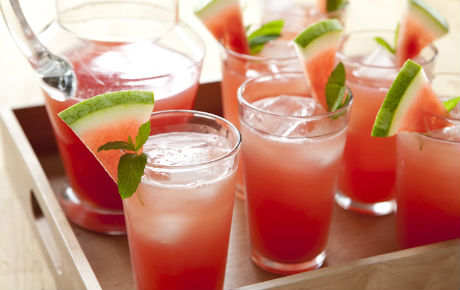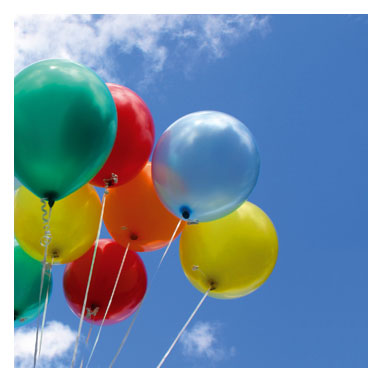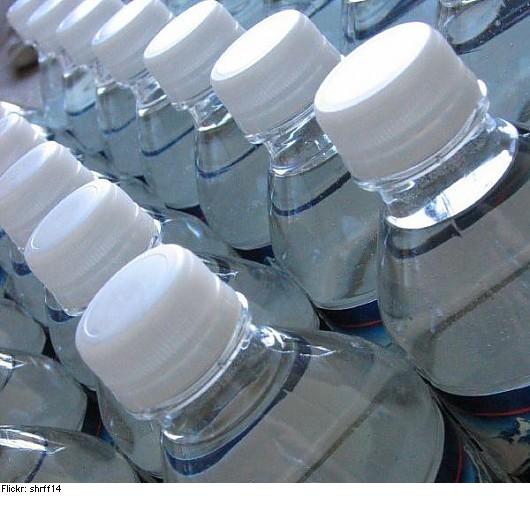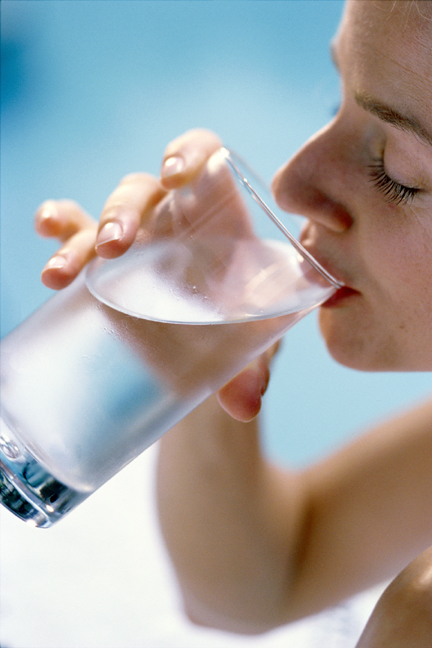Losing weight and regaining health require staying hydrated. Find out what that looks like and why it's important after weight-loss surgery.
watermelon coolers

One of the most important things to remember for long term weight-loss success is not to eat and drink at the same time. Drinking fluids while eating washes food from the pouch.
The longer you can go without washing food from your pouch, the longer you stay satisfied, and the less you want to eat, snack or graze. The experts in the field of bariatrics say that this is perhaps the biggest key to success.
For me, this was probably the hardest thing to put into practice after I had weight-loss surgery, but after a while, it became a habit.
It is, however, important to hydrate between meals. This gives us a great opportunity to stay full with summer coolers such as low-calorie or calorie-free beverages.
Instead of focusing on NOT drinking while eating, change the focus to having a refreshing beverage treat in-between meals. Try adding watermelon and lemon juice to your water for a low calorie treat. Or add a cool splash of fruity flavors to unsweetened tea. Natural low calorie sweeteners, such as stevia, add a sweet refreshing alternative.
Yes, you can. You have many more miles to go!
are you about to "pop"?

it's up in the air....
Whether you say, soft drinks, pop, soda or soda pop, there are about as many opinions about drinking these fizzy beverages after gastric bypass surgery as there are people!
Here are some facts...so you decide...it really all comes down to what choices you make and what you choose regarding your health. Yes, you get to make that decision. You get to choose, and it's more than just whether it's a Coke or a Pepsi, Diet or regular, soda or pop, there may be much more at stake.
It's up to you...
about to pop
1. Drinking soda with caffeine and sugar causes your body to become dehydrated. It actually makes you thirsty.
2. You could jeopardize your weight loss success. A can of Coke contains 10 teaspoons of sugar. An 8 ounce can of soda has around 100-200 calories. Not only are the calories from soda pop empty of any nutritional value, they also deplete your body of vital minerals.
3. It's addicting. Roland Griffiths, Ph.D., professor of psychiatry and neuroscience at Johns Hopkins says, "The latest research demonstrates, however, that when people don't get their usual dose (of caffeine) they can suffer a range of withdrawal symptoms, including headache, fatigue, difficulty concentrating. They may even feel like they have the flu with nausea and muscle pain."
4. Need your teeth? The amount of acid in soda pop is enough to wear away at the enamel of your teeth over time. Teeth with weakened enamel are more sensitive and more susceptible to decay. In tests done on the acidity levels of soda, soda was found to have a pH of 2.5. To put that into perspective, consider that battery acid has a pH of 1 and pure water has a pH level of 7.
5. Need oxygen? What does ph mean? pH stands for potential of Hydrogen. It's a scale that measures a substances alkaline (oxygen rich) or acidic (oxygen deprived) level. The scale ranges from 1 to 14 with seven being where you optimally want to be. 1 is acidic, 14 is alkaline.
6. Need more money? Water is cheaper than soda. Let's say you drink 2 cans of soda a day, you could pay $206 over the course of a year to keep that soda habit going. If there is more than one soda drinker in the house, or if you drink more than 2 cans a day, that yearly total could quickly double or triple!
7. Researches at the University of Texas Health Science Center found that diet sodas put a person at a higher risk of becoming overweight. According to their research, "artificial sweeteners can interfere with the body's natural ability to regulate calorie intake. This could mean people who consume artificially sweetened items are more likely to overindulge."
8. Colas lower bone mineral density. Most colas contain phosphoric acid and caffeine which drain calcium out of the bones. Also, because caffeine is a diuretic and increases urine volume, more minerals are leaving the body before having a chance to be absorbed and put to use.
Dietary calcium helps to stimulate fat breakdown and reduce its uptake into adipose tissue. Epidemiological and clinical studies have found a close association between obesity and low dietary calcium intake. Recent studies have found that maintaining sufficient amounts of dietary calcium helps to induce weight loss or prevent weight gain following diet.
9. Got diabetes? According to a researcher from Children's Hospital Boston, the fact remains "when sugar enters the bloodstream quickly, the pancreas has to secrete large amounts of insulin for the body to process it. Some scientists believe that the unceasing demands that a soda habit places on the pancreas may ultimately leave it unable to keep up with the body's need for insulin. Also, insulin itself becomes less effective at processing sugar; both conditions contribute to the risk of developing diabetes."
10. Any beverage with carbonation, such as soft drinks, champagne, beer, and seltzer waters, force food through the stomach, reducing the time food remains in the pouch. The less time food remains in your stomach, the less satiety or feelings of fullness you experience.
11. An article written by "Beyond Change" on carbonated beverages after weight loss surgery states, "The gas released from a carbonated beverage may "stretch" your stomach pouch. Food forced through the pouch by the carbonation could also significantly enlarge the size of your stoma (the opening between the stomach pouch and intestines of patients who have had a gastric bypass or biliopancreatic diversion). An enlarged pouch or stoma would allow you to eat larger amounts of food at any one setting."
12. As if you needed the added risk of deficiencies, studies show that drinking soda may also cause calcium deficiencies from the high amounts of phosphoric acid that they contain. Phosphate binds to calcium and the bound calcium cannot be absorbed into the body. Both animal and human studies have found that phosphoric acid is associated with altered calcium homeostasis and low calcium.
13. Need more? Research reported by "Beyond Change" reports that, "Drinking these acidic beverages on an empty stomach in the absence of food, as Bariatric patients are required to do, can upset the fragile acid-alkaline balance of the gastric pouch and intestines and increase the risk for ulcers or even the risk for gastrointestinal adenomas (cancer).
14. Raise your hand if you want to grow old faster! Soft drink usage has also been found to be associated with various other health problems. These include an increased risk for diabetes, cardiovascular disease, kidney stones, bone fractures and reduced bone density, allergies, cancer, acid-peptic disease, dental carries, gingivitis, and more. Soft drinks may, in addition, increase the risk for oxidative stress. This condition is believed to contribute significantly to aging and to diseases associated with aging and obesity, i.e. diabetes, cancer, cardiovascular disease, liver disease, reduced immune function, hypertension, and more.
still up in the air?
So whether you say "pop" or "soda" or "soft drinks", Ask yourself these questions. Is the choice you made to have surgery based on health? Is your choice to drink soda or other carbonated beverages based on the same principles?
I hate to "burst" your bubble, but you might want to "pop" into reality. It would seem that drinking all those bubbly sodas will "pop" your chances of achieving your best health and long lasting weight loss success. Don't "burst" your changes of health, wellness and weight loss surgery success. The choice is still up to you.
With all the evidence against sugary laden sodas, why do you think there is so much controversy over soda pop? Could it be that it just might be that we really just don't want to give it up? Our health is kind of like those balloons, once its "out of hand", you might not ever get it back...
Some information taken from an article "Why Carbonated Beverages are "TABOO" after bariatric Surgery"By: Cynthia Buffington, Ph.D
eat, drink, and...drink some more
Drinking 64 ounces of water a day can be difficult during the first few months after surgery. Don't expect to get the full amount in at first, but this is a good goal. Drink as much as you can between meals, don't stress, you'll get there!

You want to prevent dehydration, so it's good to get into the habit of drinking fluids. Dehydration can be fatal...
Our goal is to get into a lifetime habit of drinking our required amount of fluid each day. How do you get it all in? It can be hard, especially since you have a tiny tummy and you may not be in the habit of drinking 64 ounces a day.
Here's what helped me...
Develop the habit
I started by drinking as much as I could before breakfast, this would be a good time to get in those multi-vitamins.
Eating within an hour of waking is recommended to boost your metabolism, so that leaves 30 minutes to drink and 30 minutes to wait before eating. Try sipping a cup of water or hot tea while getting dressed. Think of your new pouch as a tiny funnel. It can only hold so much because not only is it small, but the opening at the bottom is about the size of a dime. Liquids need time to pass through. Little sips don't stress the new little pouch as it heals.
Next, wait at least thirty minutes after a meal, (at least...least...meaning least, not most), 60 to 90 minutes is best. This will give you a short break from all that drinking. Resume drinking water or liquids after meals. Try drinking as much as you can between meals. Keep a water bottle handy and sip throughout the day.
How much is enough?
A good rule of thumb is 64 ounces a day. They say, (that would be the experts), to calculate the amount you should drink, is divide your weight in half and drink that amount of ounces, but some of us (us...that would have included me) would drown. Besides there's not that much time in a day! Ok...that was a joke...one I used to tell on myself...and yes you can drink too much...so 64 ounces is safe.
Don't forget to drink up until a little before bedtime. I'm not sure how scientific it is, but walking seems to help flush out that fluid, so get moving.
Measure and plan
It's a good idea to measure out the amount of water you plan to drink for the day, so you'll know when you have reached your goal.
You could drink 4 - 16 oz bottles of water, or 2 - 33 oz bottles, maybe fill a 64 oz bottle or pitcher and you're good to go! Again, don't be frustrated if you can't get it all in at first, but the goal is to keep at it until you can. It can be done and you will reap the reward in the end. I find it easier to fill smaller containers or use smaller bottles rather than too large. Smaller portion or bottles can be easier on the eyes and mind as well, it doesn't look overwhelming! Let's say you had 4 - 16 oz bottles. One bottle before lunch, two in the afternoon, and one between dinner and bedtime...see, that wasn't so bad!
Conclusion with inclusion
I'll conclude by including a tip I learned years ago. If it's hard, start slowly, adding something to it, like ice, or a straw, even a lemon or a cumcumber slice. Try freezing a small portion and adding new flavors. If you find the straw puts too much air in the new tummy, wait a few months. Cold may hurt also, you have to find what works for you. If cold hurts, try warmer water. Warm water works well in the morning for lap-band because warm water relaxes the tummy muscles. Even room temperature is good.
Also, adding something in the water, for some unknown reason, this helps sooth the tummy of weight loss surgery patients in the beginning stages. Adding tea or lemon may help. There is a former post on the blog that gives ideas for adding ingredients to your water...just search the search bar on the left for "water".
Why drink so much water?
Getting enough water is important for losing weight, helping your body flush out impurities, fat and toxins. It helps your kidneys and liver work well...we need that liver to metabolize food. Water makes our skin better, we need it to look it's best and shrink along with the rest of us! Drinking water helps keep you full between meals, so if you develop the habit early on, you can tame that appetite when it returns, by filling your tummy with water. There are so many reasons to drink fluids for better health. So make it a habit...
I'll be seeing less of you next time...yes, we can, we have many more miles to go!
hunger control: key to success

Studies done by leading surgeons in the field of Bariarics show that regardless of the pouches ability to stretch, if care is taken during the first two years after surgery, during the crutial healing and stretching time for the pouch, the common factor in successful weight loss maintenance is the ability to control hunger.
Studies were done by Dr. Flanagan, which proved that no matter what size the pouch was after the two year healing period, the common thread that connected the success of weight loss patients was the ability to use their pouch tool effectively making necessary life style changes, maintaining satiety.
Dr. Latham Flanagan, a leader in the field of Bariatrics, says, "The implication is clear that learning how to use the pouch/tool effectively is important and it is our responsibility as bariatric surgeons to see that effective teaching is made available to our patients over this two year period of changing intake and satiety control. In brief, the Cottage Cheese Test data tells us that within the context of a small meal volume, lifestyle change including exercise is the most important variable. The stepwise progressive growth in the functional pouch volume (meal size) probably defines the rate of weight loss for the patients taken as a whole, but the degree of weight loss and maintenance for the individual patient is more dependent upon that patient's ability to make the required lifestyle changes: proper use of the pouch/tool and adequate amounts of activity and exercise."
THREE PRINCIPLES FOR GAINING AND MAINTAINING SATIETY
1. The pouch needs to be truly filled with adequate wall distention with each meal (i.e. no snacking).
2. Keep the pouch filled over time and slow down the emptying time (by eating solid foods and avoiding liquids for fifteen minutes before and one and one half to two hours after eating. We understand this to be the most important lifestyle change after the gastric bypass procedure.
In a standard gastric emptying test using radioactive sulfur with a scrambled egg, bread, and milk indicates the following results: milk: 90% of the meal volume has exited the stomach within forty-five minutes. However, without the milk, only 45% of the meal has exited the stomach by ninety minutes.
3. Finally, adequate protein with each meal. We emphasize three meals a day including breakfast (defined as the first meal of the day which is eaten within one to two hours after arising). We define the "enemy" as high calorie liquids. We point out that snacking and high calorie liquids cheat the patient because the calories are taken in without offering significant satiety.
Full meals, which means, enough food to fill the pouch and not snacks which do not fill the pouch fully can be the key to satiety. In between meals, water is used to maintain satiety in a technique known as "water loading". Keeping the pouch full as long as possible after eating a meal and knowing how to keep your pouch full between meals with water seems to be a great tool for successful weight loss, along with healthy life style changes.
For more info see post entitled "wet your whistle".
Yes, we can, we have many more miles to go!
wet your whistle
 Warmer weather is just around the corner, and we won't need much encouragement when the intense summer heat rolls around to '"wet our whistles" with cool and frosty beverages.
Warmer weather is just around the corner, and we won't need much encouragement when the intense summer heat rolls around to '"wet our whistles" with cool and frosty beverages.
The expression, "wet your whistle" is an idiom. Whistle is a reference to your mouth or throat referring to the fact that it's not easy to whistle with a dry mouth. It’s a very ancient expression: its first recorded appearance is in Chaucer’s Canterbury Tales at the end of the fourteenth century, and could possibly be even older.
We are told after weight loss surgery not to wet our "whistles" while eating. We further understand that drinking fluids washes food from your pouch, leaving you hungry sooner.
Even so, getting your fluid intake is extremely important to good health and maintaining weight loss no matter what the season, and requires a little co-ordination for weight loss surgery patients. But did you know that drinking water between meals may actually be one of the keys to successful weight loss and keeping it off? That's enough incentive to wet your whistle!
Not drinking with meals was perhaps the hardest transition piece for me after surgery. So after meals I was waiting the recommended 30 minutes, and sometimes an hour before drinking again. But recently, after doing a little research, I have been waiting at least an hour to an hour and a half, then resuming fluids. Some studies recommend even waiting up to 2 hours.
Note that this information on drinking water in the "water loading" manner is for patients with a mature pouch. New patients will be sipping water all during the day, still leaving time (30 minutes before meals, 30 minutes during the meal, and 30 minutes after the meal) before returning to drinking. Water loading is for those who have lost their weight and have a mature enough pouch to hydrate sufficiently between meals. This "water loading" is for satiety after hunger returns.
Here's what Dr. Latham Flanagan states in a study on the subject. Dr. Flanagan is a leader in the field of Bariatrics. "Following the meal, take no liquids for one and a half hours, or even two hours if satiety is lost too soon before the next meal. Then, after that one and a half to two hours is up, begin drinking low or no calorie fluids somewhat slowly (in order to avoid over load symptoms if there is still considerable food in the pouch) and then progressively accelerate drinking up to fifteen minutes before the next meal. The patient should be urged to drink a lot of water in the two hours or so before the following meal. This period of re-hydration ends with a "fluid load" fifteen minutes before the next meal."
Drinking water is about hydration, and also about remaining satisfied between meals. This seems to play a major role in maintaining weight loss. For more on this subject, look for an upcoming blog post on satiety.
Dr. Flanagan continues, "However, a single pre-meal fluid load can never adequately re-hydrate an individual who has not already been drinking a lot of fluid. Fluid loading can be done any time in the two to three hours preceding the meal if hunger is experienced. This use of the fluid load can substitute for taking in unwanted calories through snacking." Latham Flanagan, Jr., M.D., FACS, Weight Loss Surgery Information Center
Fluid loading or water loading is the rapid drinking of a non-calorie or low-calorie liquid on an empty stomach in order to achieve a maximal intake of water at that time and/or achieve immediate satiety which lasts for fifteen to twenty-five minutes. About 80% of the estimated maximum capacity at any given time should be drunk rapidly over fifteen to thirty seconds and then topped off with swallows until full satiety is reached.
During the first six months, gastric bypass patients are very frequently drinking water throughout the day to meet minimal fluid requirements. The return of appetite in patients at about six months. As the pouch stretches out, due to the normal healing process, the patient can ordinarily drink six to eight ounces at a time.
So grab a frosty mug, maybe ice cold sugar free lemonade, or that southern summer favorite, iced tea, unsweetened that is, or just water, if you please, and wet your whistle...you'll be glad you did.
